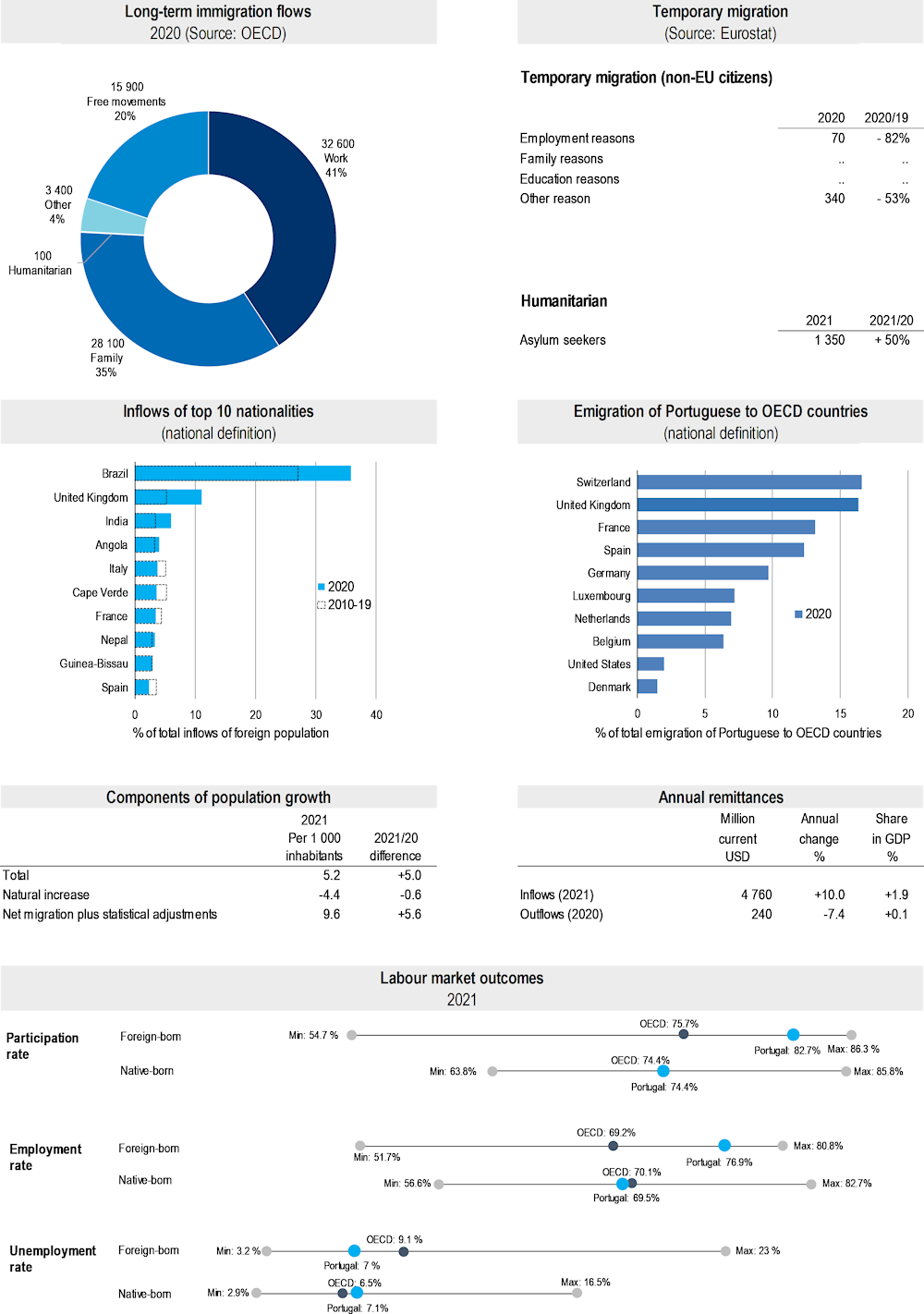In 2020, Portugal received 80 000 new immigrants on a long-term or permanent basis (including changes of status and free mobility), ‑18.6% compared to 2019. This figure comprises 19.9% immigrants benefitting from free mobility, 40.7% labour migrants, 35.1% family members (including accompanying family) and 0.1% humanitarian migrants. Around 12 000 permits were issued to tertiary-level international students. In addition, 29 000 intra-EU postings were recorded in 2020, a decrease of ‑42% compared to 2019. These posted workers are generally on short-term contracts.
Brazil, the United Kingdom and India were the top three nationalities of newcomers in 2020. Among the top 15 countries of origin, the United Kingdom registered the strongest increase (4 800) and Brazil the largest decrease (‑6 600) in flows to Portugal compared to the previous year.
In 2021, the number of first asylum applicants increased by 50% to reach around 1 400. The majority of applicants came from Afghanistan (600), Morocco (100) and India (80). The largest increase since 2020 concerned nationals of Afghanistan (600) and the largest decrease nationals of Gambia (‑90). Of the 510 decisions taken in 2021, 60% were positive.
In May 2022 Portugal published the final report of the National Implementation Plan of the Global Compact for Migration, a document that takes stock of the progress made since 2020, including some relevant achievements such as the significant growth of the decentralised response network to support migrants, the development of a management system to collect information to better understand the needs and profiles of migrants in order to formulate better intervention responses, and the launching of the Migrant Reception Guide, which is intended to facilitate the work of public and private institutions and civil society and to support migrants wishing to live in Portugal.
Reflecting Portugal’s continued commitment to promoting safe, orderly and regular migration and the 23 GCM objectives, a new version of the National Plan is being prepared. The new document will heed the best practices implemented, but also the ongoing challenges. The document will also be informed by the outcome of the civil society consultation process conducted in 2021 by the High Commission of Migration in partnership with the International Organisation for Migration.
The Decree‑Law 14/2021 went into force on 1 January 2022, and stricter requirements to obtain a “golden visa” came into effect. Residence permits for investment will no longer be possible based on real estate investment in Lisbon, Porto, Algarve and coastal regions, once properties acquired that are intended for housing, only allow access to this regime if they are located in the Autonomous Regions of the Azores and Madeira or in the territories of interior. There is no change, however, on the threshold amounts for real estate investment that remain at EUR 500 000 or EUR 350 000 if the building is older than 30 years.
Residence applications for investment on other grounds will be subject to higher investment thresholds. The threshold for capital transfers increased from EUR 1 to 1.5 million.
The minimum requirement for transfers for research activities, holdings in investment and/or venture capital funds, and the incorporation of commercial companies increased from EUR 350 000 to 500 000.
Due to the COVID‑19 pandemic, many immigrants have not been able to renew their visas or permits. In February 2022, the government prolonged the exceptional measures taken the previous years. All documents and visas related to the stay in national territory that have expired since early March 2020 are deemed valid until 30 June 2022. These documents will continue to be accepted after 30 June 2022, as long as the holder provides proof that he/she has scheduled an appointment to renew the documents. Furthermore, all foreign citizens with cases pending at the Foreigners and Borders Service (SEF), who filed a request by 31 December 2021, are temporarily in a situation of regular stay in the country and have access to health, social support, employment and housing.
For further information: www.acm.gov.pt | www.om.acm.gov.pt | www.sef.pt

